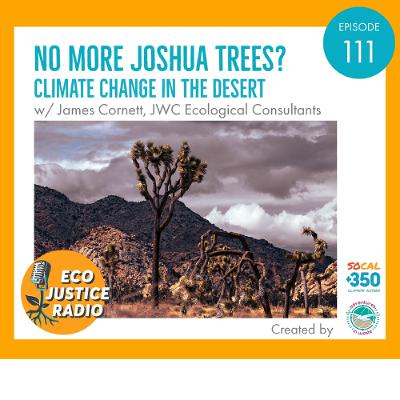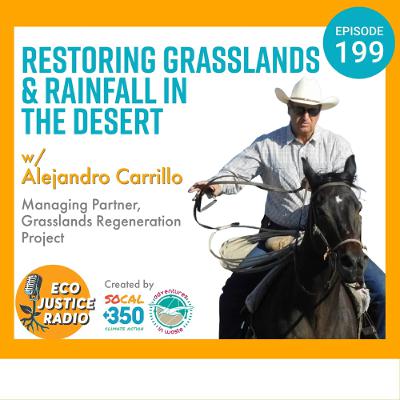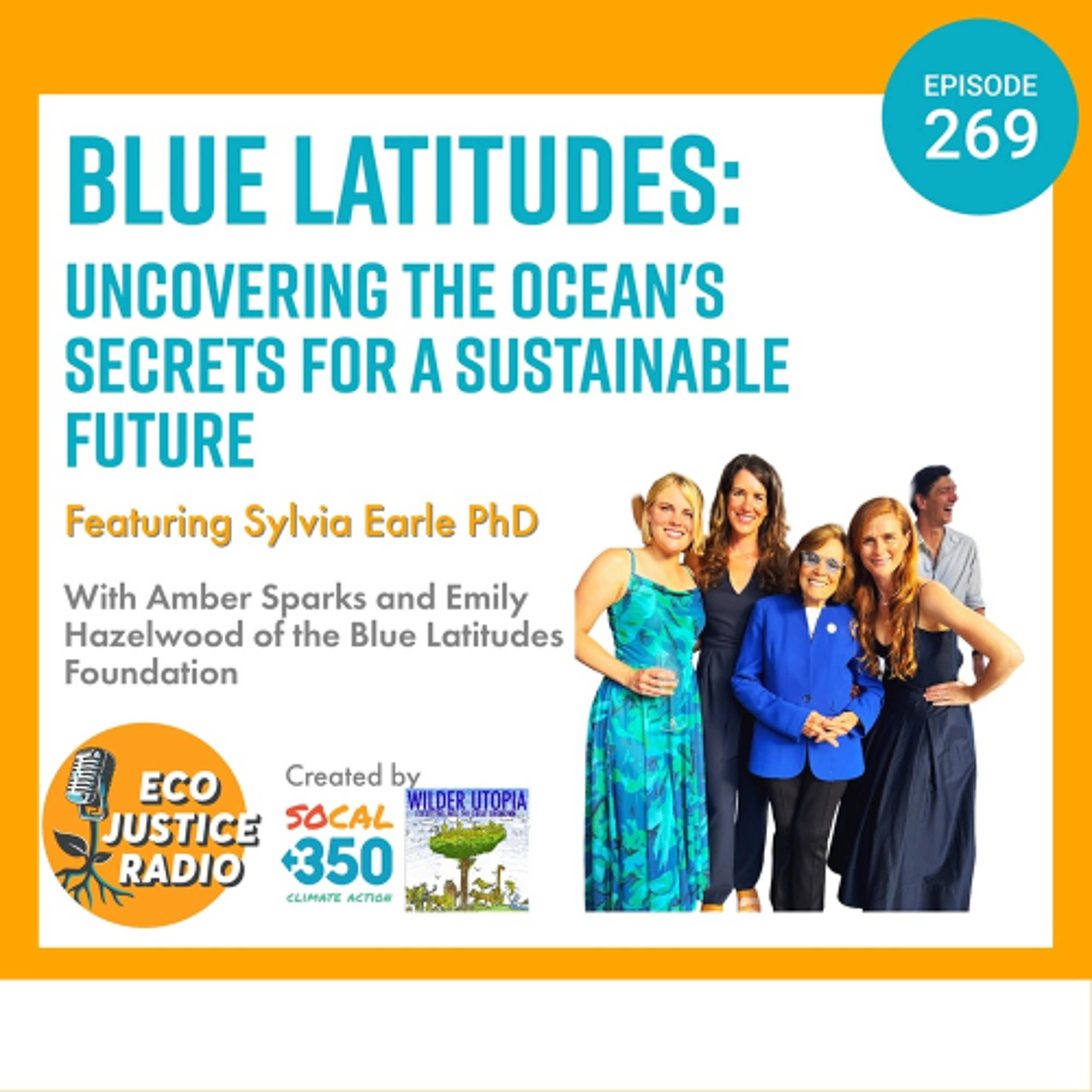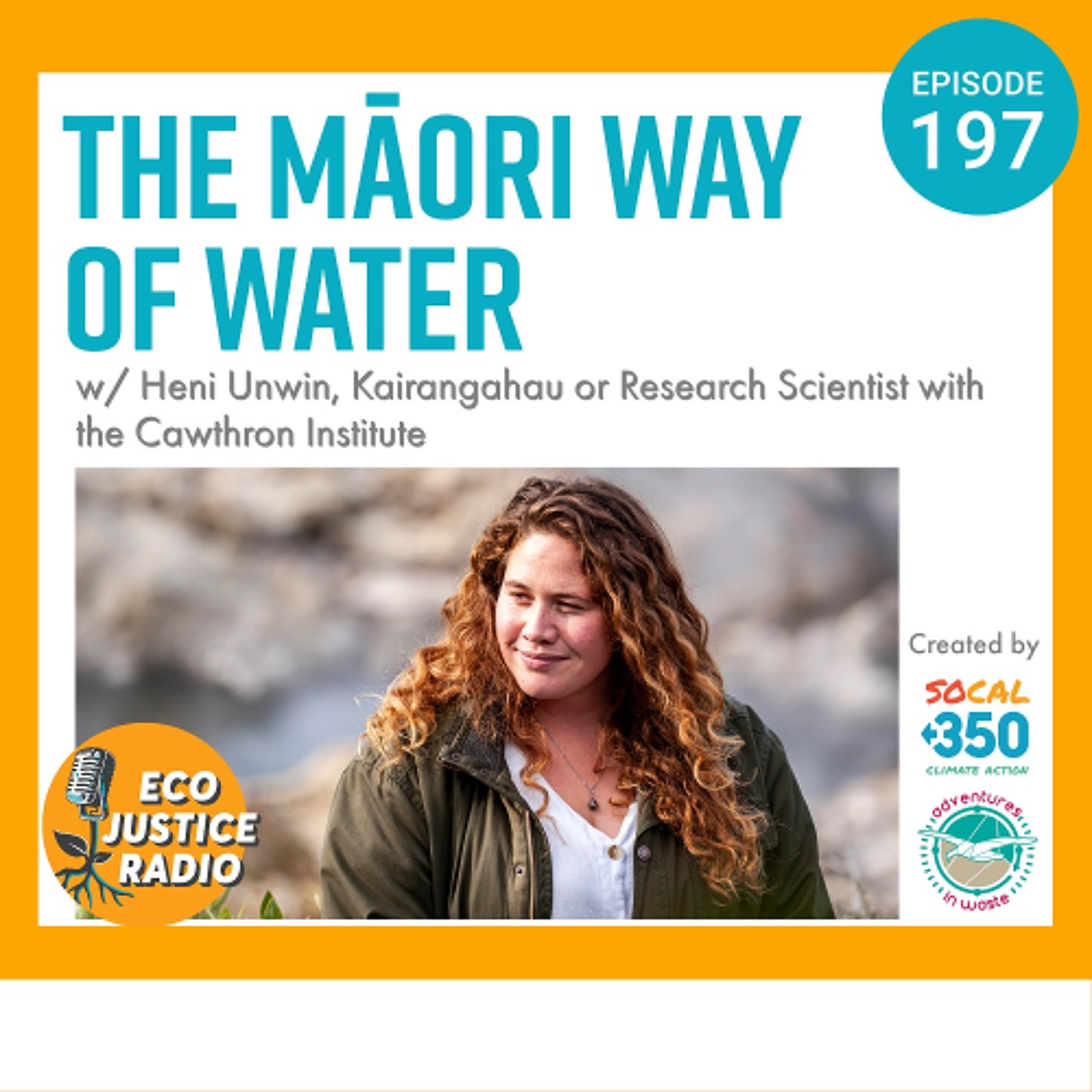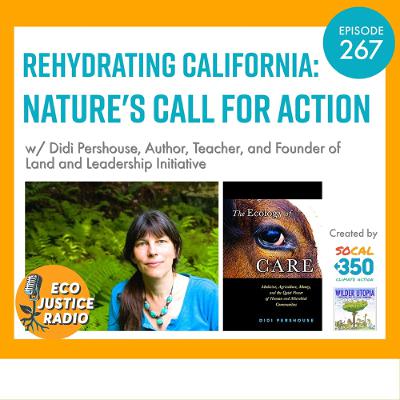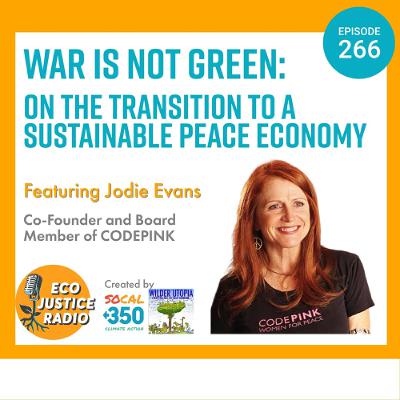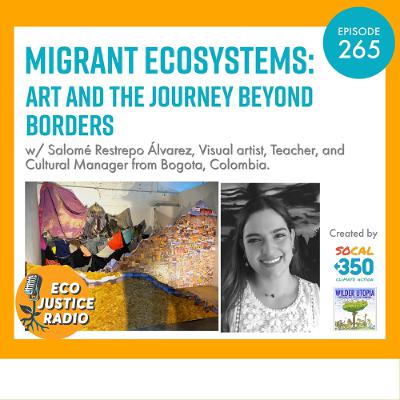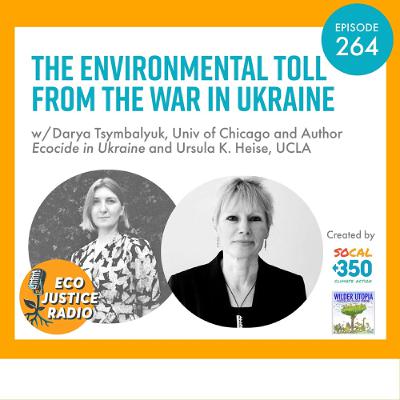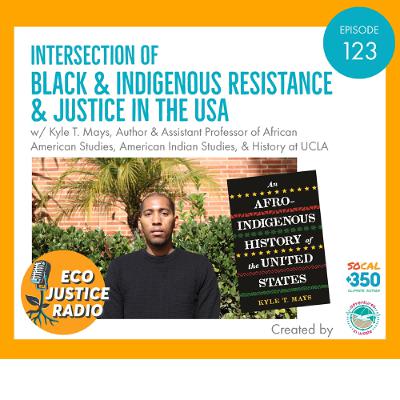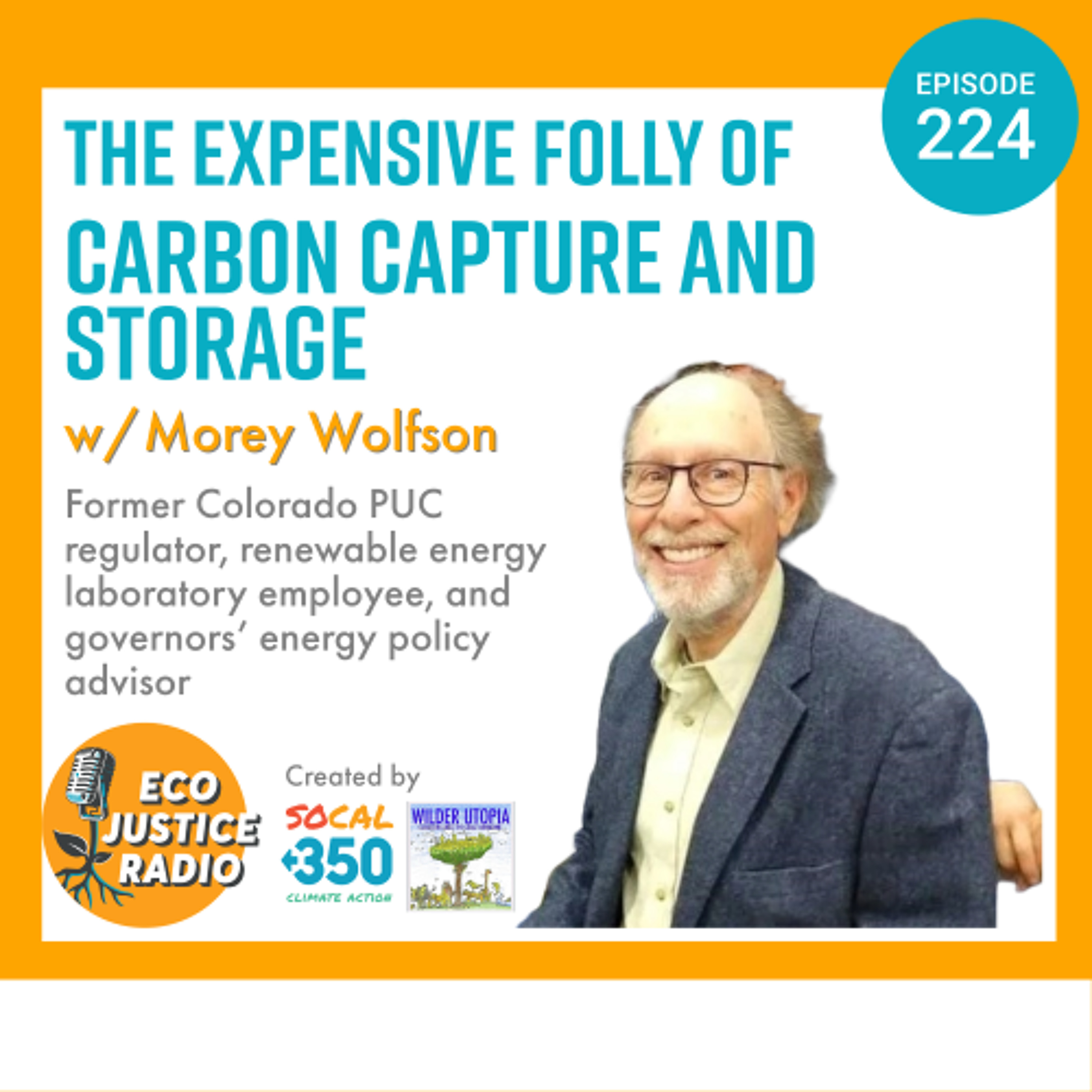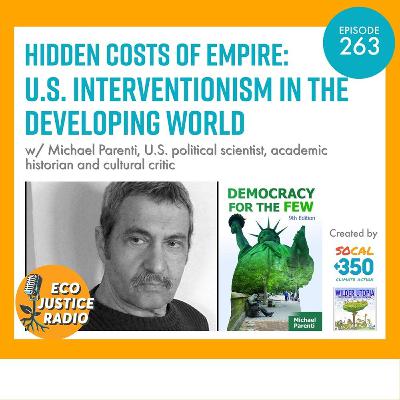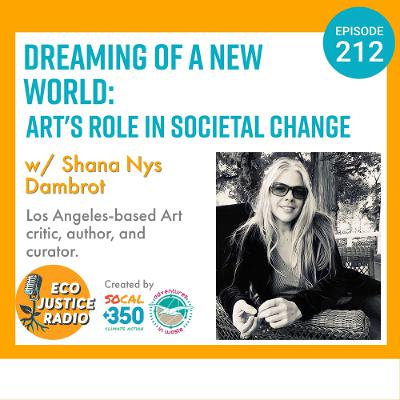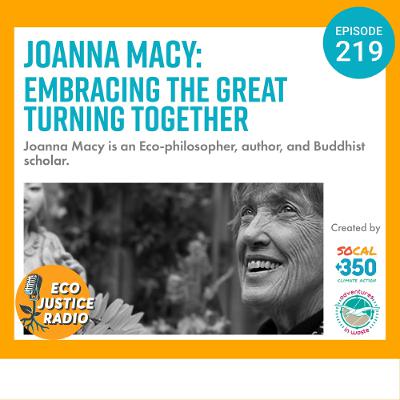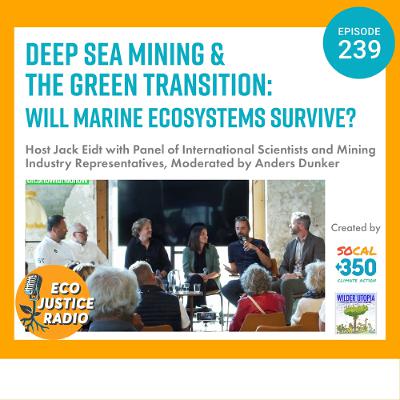Discover EcoJustice Radio
EcoJustice Radio

EcoJustice Radio
Author: SoCal 350 Media
Subscribed: 55Played: 1,200Subscribe
Share
© All rights reserved
Description
EcoJustice Radio presents environmental and climate stories from a social justice frame, featuring voices not necessarily heard on mainstream media.
Our purpose is to amplify community voices, broaden the reach of grassroots-based movements, and inspire action. We investigate solutions for social, environmental, and climate issues with an eye to advance human health, steward wild landscapes, and solve the climate crisis across the USA and the world.
Featured weekly on KPFK Los Angeles and KPFT Houston, and found on all major podcast apps. We are nationally syndicated through the Pacifica Network and PRX and heard on public radio stations across the US and downloaded in over 25 countries.
Co-hosts Jack Eidt, Carry Kim, and Jessica Aldridge present a broad range of perspectives: land defenders and water protectors; Indigenous leaders, front/fenceline community spokespeople; youth organizers; ecosystem and land stewards; regenerative farmers and permaculture specialists; spiritual and faith leaders; environmental health advocates and practitioners; documentary filmmakers; climate scientists; and political decision makers.
EcoJustice Radio [http://EcoJusticeRadio.org] is produced by SoCal350.org since 2017.
Tune in live to KPFK Radio Thursdays from 4 to 5 PM (PT) at 90.7 FM Los Angeles, 98.7 FM Santa Barbara, 93.7 FM North San Diego, 99.5 FM Ridgecrest-China Lake, or KPFK.org.
We also are featured on KPFT Houston from 4 to 5 PM (CT) at 90.1 FM or KPFT.org and other public radio stations on the Pacifica Network.
Our purpose is to amplify community voices, broaden the reach of grassroots-based movements, and inspire action. We investigate solutions for social, environmental, and climate issues with an eye to advance human health, steward wild landscapes, and solve the climate crisis across the USA and the world.
Featured weekly on KPFK Los Angeles and KPFT Houston, and found on all major podcast apps. We are nationally syndicated through the Pacifica Network and PRX and heard on public radio stations across the US and downloaded in over 25 countries.
Co-hosts Jack Eidt, Carry Kim, and Jessica Aldridge present a broad range of perspectives: land defenders and water protectors; Indigenous leaders, front/fenceline community spokespeople; youth organizers; ecosystem and land stewards; regenerative farmers and permaculture specialists; spiritual and faith leaders; environmental health advocates and practitioners; documentary filmmakers; climate scientists; and political decision makers.
EcoJustice Radio [http://EcoJusticeRadio.org] is produced by SoCal350.org since 2017.
Tune in live to KPFK Radio Thursdays from 4 to 5 PM (PT) at 90.7 FM Los Angeles, 98.7 FM Santa Barbara, 93.7 FM North San Diego, 99.5 FM Ridgecrest-China Lake, or KPFK.org.
We also are featured on KPFT Houston from 4 to 5 PM (CT) at 90.1 FM or KPFT.org and other public radio stations on the Pacifica Network.
335 Episodes
Reverse
In this episode, we explore the critical role lithium plays in the clean renewable energy transition, focusing on the potential of the Salton Sea in the Southern California desert as a lithium-rich resource. Well, there has been plenty of hype from industry as well as some clean energy advocates and environmentalists saying this could be the answer to many environmental problems with hard rock mining and brine evaporation for lithium around the world. We feature an interview with Dr. James J. A. Blair of Cal Poly Pomona, as well as multiple news reports, testimony from Preston Arrow-weed, a Quechan-Kamia knowledge keeper, Christian Torres from Comite Civico del Valle in Brawley, Dr. Ali Sharbat of Cal Poly Pomona, and Daniela Flores of the Imperial Valley Equity and Justice Coalition.
Support the Podcast via PayPal https://www.paypal.com/donate/?hosted_button_id=LBGXTRM292TFC&source=url
Also, check out two pieces published on PBS SoCal, host Jack Eidt’s project with art-photojournalist Osceola Refetoff, where these issues are illustrated with incredible visuals from both the Salton Sea and Chile.
White Snake of Knowledge: Lithium Boom on the Salton Sea: https://www.pbssocal.org/shows/artbound/the-white-snake-of-knowledge-a-lithium-boom-at-the-salton-sea
Green Extractivism: Can Our Deserts Survive Our Thirst for Lithium: https://www.pbssocal.org/shows/artbound/green-extractivism-can-our-deserts-survive-our-thirst-for-lithium
More on the environmental justice advocacy in the Salton Sea: https://ccvhealth.org/hells-kitchen?lang=us
In our third segment we share an interesting discussion from the 2025 Bioneers Conference around the impacts of clean energy balanced with the urgent need to transition away from climate-wrecking fossil fuels with Bill McKibben of Third Act and 350.org Co-Founder, Colette Pichon Battle from Taproot Earth, and Eriel Deranger from Indigenous Climate Action. Join us as we delve into the intersection of technology, environmental justice, and community impact in the pursuit of clean energy.
For an extended interview and other benefits, become an EcoJustice Radio patron at https://www.patreon.com/ecojusticeradio
Sources:
Dr. James J. A. Blair [https://www.jamesjablair.com/] is an author, environmental consultant, and Associate Professor in Geography and Anthropology at California State Polytechnic University, Pomona. His work centers on energy, water, and environmental justice, especially related to extractive industries, including mining, fossil fuels, dams, logging, and fishing. Specific case studies include: geothermal lithium extraction at the Salton Sea in California; lithium mining, hydroelectric dams, and industrial logging in Chile and Argentina; as well as offshore oil and commercial fishing in the Falkland Islands (Malvinas).
Jack Eidt is an urban planner, environmental journalist, and climate organizer, as well as award-winning fiction writer. He is Co-Founder of SoCal 350 Climate Action and Executive Producer of EcoJustice Radio. He writes on desert environmental and cultural issues for an L.A.-Press-Club-honored project on PBS SoCal called High & Dry [https://www.pbssocal.org/people/high-dry]. He is also Founder and Publisher of WilderUtopia [https://wilderutopia.com], a website dedicated to the question of Earth sustainability, finding society-level solutions to environmental, community, economic, transportation, and energy needs.
Podcast Website: http://ecojusticeradio.org/
Podcast Blog: https://www.wilderutopia.com/category/ecojustice-radio/
Support the Podcast: Patreon https://www.patreon.com/ecojusticeradio
PayPal https://www.paypal.com/donate/?hosted_button_id=LBGXTRM292TFC&source=url
Executive Producer and Host: Jack Eidt
Engineer and Original Music: Blake Quake Beats
Episode 272
Photo credit: Jack Eidt
The Joshua tree is an icon and ecological keystone of the California deserts. However, climate disruption with hotter, drier summers and more frequent brush fires, threatens that some day soon Joshua Tree National Park will no longer have any Joshua trees.
We discuss these systems and investigate what solutions are needed. Are solar farms in the desert an appropriate renewable energy solution, or do they cause more harm than good? What about the consequences of lithium mining in Death Valley for electric vehicles? Did you know it is not a wise idea to grow your own Joshua Tree from imported seeds?
Our guest, James Cornett [https://www.amazon.com/stores/James-W.-Cornett/author/B001K84BWE?ref=ap_rdr&isDramIntegrated=true&shoppingPortalEnabled=true], is an ecologist, author, and principal biologist at JWC Ecological Consultants. He is one of the West's most prolific writers with more than forty-four books published. As former Director of Natural Sciences at the Palm Springs Desert Museum, he continues to share his love of natural history through writing, teaching, and lecturing. He is the first professional naturalist to have visited all nine of the world's great deserts and is writing a book on his travels and research in each.
Podcast Website: http://ecojusticeradio.org/
Podcast Blog: https://www.wilderutopia.com/category/ecojustice-radio/
Support the Podcast: Patreon https://www.patreon.com/ecojusticeradio
PayPal https://www.paypal.com/donate/?hosted_button_id=LBGXTRM292TFC&source=url
Executive Producer and Host: Jack Eidt
Engineer and Original Music: Blake Quake Beats
Episode 111
In this episode, we confront the devastating aftermath of Hurricane Melissa, the strongest storm in recorded history to strike Jamaica with massive damage to Haiti, the Dominican Republic, and Cuba. We hear firsthand accounts from Jamaican survivors who faced terrifying winds and flooding, and we delve into the role of climate change in intensifying such storms. We feature two climate scientists, Dr. Michael Mann and Dr. Daniel Swain, juxtaposed with a documentarian on the ground, Jonathan Petramala.
Join us as we explore the urgent need for aid and the resilience of the Jamaican people in the face of catastrophe.
Support the Podcast via PayPal https://www.paypal.com/donate/?hosted_button_id=LBGXTRM292TFC&source=url
Several days of torrential rains, storm surges and catastrophic flooding caused by Hurricane Melissa have impacted the lives of more than 700,000 children across the Caribbean.
For an extended interview and other benefits, become an EcoJustice Radio patron at https://www.patreon.com/ecojusticeradio
Sources:
Hurricane Melissa’s Ground Zero - Jonathan Petramala https://youtu.be/WjI0RD2s0To?si=l_No92HjV-pWzMNN
Hurricane Melissa: The Fight to Reconnect Survivors https://youtu.be/Nhy9ZkSw_iQ?si=IM63dbmLiJ58Zf8D
Michael Mann Discusses Impact of Hurricane Melissa on MSNBC with Chris Jansing
https://youtu.be/AQ5OMZWJKRo?si=JY5vaFLDmD3ywSVb
Dr. Daniel Swain of Weather West speaks on the dynamics of Hurricane Melissa
https://www.youtube.com/live/mZJXmweDr0g?si=emPVEs_l4X1zIyET
Dr. Michael E. Mann [https://michaelmann.net/] is Presidential Distinguished Professor in the Department of Earth and Environmental Science at the University of Pennsylvania, with a secondary appointment in the Annenberg School for Communication. He also serves as Vice Provost for Climate Science, Policy, and Action and Director of the Penn Center for Science, Sustainability, and the Media (PCSSM).
Dr. Daniel Swain is a climate scientist focused on the dynamics and impacts of extreme events—including droughts, floods, storms, and wildfires—on a warming planet. Daniel holds joint appointments as a climate scientist within the California Institute for Water Resources within University of California Agriculture and Natural Resources (UCANR) and as a research partner at the NSF National Center for Atmospheric Research.
He engages extensively with journalists and other media to facilitate accessible and accurate coverage and conversations surrounding climate change. He also authors the Weather West blog (weatherwest.com), which provides real-time perspectives on California weather and climate.
Jonathan Petramala [http://www.youtube.com/@JonathanPetramala] is an independent journalist and documentarian with over 20 years of experience. He focuses on documenting major disaster events, bringing attention to the power and resilience of the human spirit.
Jack Eidt is an urban planner, environmental journalist, and climate organizer, as well as award-winning fiction writer. He is Co-Founder of SoCal 350 Climate Action and Executive Producer of EcoJustice Radio. He writes on desert environmental and cultural issues for an L.A.-Press-Club-honored project on PBS SoCal called High & Dry [https://www.pbssocal.org/people/high-dry]. He is also Founder and Publisher of WilderUtopia [https://wilderutopia.com], a website dedicated to the question of Earth sustainability, finding society-level solutions to environmental, community, economic, transportation, and energy needs.
Podcast Website: http://ecojusticeradio.org/
Podcast Blog: https://www.wilderutopia.com/category/ecojustice-radio/
Support the Podcast: Patreon https://www.patreon.com/ecojusticeradio
PayPal https://www.paypal.com/donate/?hosted_button_id=LBGXTRM292TFC&source=url
Executive Producer and Host: Jack Eidt
Engineer and Original Music: Blake Quake Beats
Episode 271
Photo credit: Daniel Swain
In this episode, we explore the urgent need for bioregional climate action with Colette Pichon Battle, Eriel Deranger, and Thomas Linzey with Justin Winters moderating. These panelists came together at the 2025 Bioneers Conference in Berkeley, California [https://bioneers.org/] to share their powerful stories and insights on how local communities can drive meaningful change in the face of climate change and biodiversity loss. From Indigenous rights to community-led initiatives, this conversation emphasizes the importance of justice, equity, and local leadership in crafting effective climate strategies. Join us for a deep dive into the intersection of environmental activism and community empowerment.
For an extended interview and other benefits, become an EcoJustice Radio patron at https://www.patreon.com/ecojusticeradio
Sources:
Bioneers Conference 2025: https://conference.bioneers.org/
Eriel Tchekwie Deranger (Athabasca Chipewyan First Nation), a leading global figure in Indigenous Rights and Climate Justice activism, is the co-founder and Executive Director of Indigenous Climate Action [http://indigenousclimateaction.com/] and is a member of the International Indigenous Peoples Forum on Climate Change. She also sits on a number of boards of notable non-profit organizations (including Bioneers) and activist groups.
Thomas Linzey, Senior Legal Counsel for the Center for Democratic and Environmental Rights [https://www.centerforenvironmentalrights.org/], widely recognized as the founder of the contemporary community rights movement, drafted the very first “rights of nature” law in the world (in Pennsylvania in 2006), and consulted on the very first rights of nature constitutional provisions (in Ecuador). Linzey co-founded the Community Environmental Legal Defense Fund. Linzey’s work has been featured widely, including in leading publications including the NY Times, Mother Jones and the Nation magazine.
Colette Pichon Battle, a generational native of Bayou Liberty, Louisiana, is an award-winning lawyer and prominent climate justice organizer. In the aftermath of Hurricane Katrina, when Black and Indigenous communities were largely left out of federal recovery systems, Colette led the Gulf Coast Center for Law and Policy (GCCLP) to provide relief and legal assistance to Gulf South communities of color.
Justin Winters is the co-founder and Executive Director of One Earth [http://oneearth.org/], a nonprofit organization that works to prove that we can solve the twin crises of climate change and biodiversity loss through three pillars of collective action: renewable energy, nature conservation, and regenerative agriculture. One Earth generates educational content, inspiring storytelling, and innovative digital tools to equip people to drive change across Earth’s 185 Bioregions. Prior to One Earth, Justin served as Executive Director of the Leonardo DiCaprio Foundation, where she built the organization’s grant-making program that awarded over $100 million in grants across 60 countries, and grew its digital media community to 80 million followers.
Jack Eidt is an urban planner, environmental journalist, and climate organizer, as well as award-winning fiction writer. He is Co-Founder of SoCal 350 Climate Action and Executive Producer of EcoJustice Radio. He writes on desert environmental and cultural issues for an L.A.-Press-Club-honored project on PBS SoCal called High & Dry [https://www.pbssocal.org/people/high-dry]. He is also Founder and Publisher of WilderUtopia [https://wilderutopia.com].
Podcast Website: http://ecojusticeradio.org/
Podcast Blog: https://www.wilderutopia.com/category/ecojustice-radio/
Support the Podcast: Patreon https://www.patreon.com/ecojusticeradio
PayPal https://www.paypal.com/donate/?hosted_button_id=LBGXTRM292TFC&source=url
Executive Producer and Host: Jack Eidt
Engineer and Original Music: Blake Quake Beats
Episode 270
Toxic Exposure: The Monsanto Roundup Trials, and the Search for Justice," reveals the dark side of the world's most widely used herbicide. Jessica Aldridge interviewed Dr. Chadi Nabhan in 2023, who offered his expert insights on the link between glyphosate and cancer, the landmark legal battles against Monsanto, and the ongoing struggle for environmental justice. Tune in for a compelling narrative that exposes the failures of regulatory agencies and the courage of individuals standing up to agrochemical giants.
For years, Monsanto declared that their product Roundup, the world's most widely used weed killer, was safe. But in 2015, scientific studies concluded that glyphosate, the active ingredient in Roundup, is probably carcinogenic. The Environmental Protection Agency (EPA) and Monsanto disagreed with the findings, as scientists worked to understand the link between glyphosate and cancer.
Dr. Chadi Nabhan's book, Toxic Exposure [https://chadinabhan.com/mybooks/], tells the true story of his role as an expert physician witness who testified in multiple state and federal trials against Monsanto. His book recounts the heartbreaking stories of numerous patients who developed the cancer non-Hodgkin lymphoma, after regularly using Roundup on yards and school grounds.
Monsanto is now owned by Bayer, one of the largest agrochemical companies in the world. These companies and the EPA downplayed the health dangers of Roundup and the active ingredient glyphosate even after Monsanto lost numerous court cases (owing billions in judgements) and settled out of court for more than $11 Billion for more than 100K patients.
In this interview we discuss the history of Roundup, the dangers of glyphosate, the trial stories and verdicts, and what the everyday person can do to fight for justice against this agricultural behemoth.
Dr. Chadi Nabhan is an expert in lymphoid malignancies and treating and diagnosing cancers. He is author of Toxic Exposure: The True Story behind the Monsanto Trials and the Search for Justice [http://www.chadinabhan.com]. He received his medical degree from Damascus University in Syria. After performing basic science research at Massachusetts General Hospital/Harvard Medical School, he completed his internal medicine residency as well as an MBA in Healthcare Management at Loyola University in Chicago. Dr. Nabhan maintains active medical licenses in five states, and has over 300 peer-reviewed articles and abstracts. He is also a sought-after speaker, moderator, facilitator, and the creator and host of his own podcast, "Healthcare Unfiltered" [https://www.youtube.com/channel/UCjiJPTpIJdIiukcq0UaMFsA].
Jessica Aldridge, Co-Host and Producer of EcoJustice Radio, is an environmental educator, community organizer, and 15-year waste industry leader. She is a co-founder of SoCal 350, organizer for ReusableLA, and founded Adventures in Waste. She is a former professor of Recycling and Resource Management at Santa Monica College, and an award recipient of the international 2021 Women in Sustainability Leadership and the 2016 inaugural Waste360, 40 Under 40.
More Info/Resources:
Buy the book, Toxic Exposure: https://chadinabhan.com/mybooks/
Salon Article: https://www.salon.com/2023/02/25/glyphosate-roundup-chadi-nabhan-interview/
Related Show: Kelly Ryerson - Glyphosate Girl - https://wilderutopia.com/ecojustice-radio/glyphosate-an-herbicide-that-kills-more-than-weeds/
Podcast Website: http://ecojusticeradio.org/
Podcast Blog: https://www.wilderutopia.com/category/ecojustice-radio/
Support the Podcast: Patreon https://www.patreon.com/ecojusticeradio
PayPal https://www.paypal.com/donate/?hosted_button_id=LBGXTRM292TFC&source=url
Executive Producer: Jack Eidt
Host and Producer: Jessica Aldridge
Engineer and Original Music: Blake Quake Beats
Nature is not fixed, but ever changing. Some of the world’s best known deserts were once fertile grasslands and forests, including the Sahara, the Mojave, the Kalahari, and Gobi deserts. Is it accurate to think of deserts as permanent? Ecosystem succession shows us that Nature can evolve from rock to forest as well as reverse itself back to dust or a barren state. According to National Geographic, drylands account for more than 40 percent of the world's terrestrial surface area. Human-caused desertification and soil erosion is changing the landscape of Earth, with Africa and Asia being particularly vulnerable; many in these regions rely on subsistence farming. Humans are accelerating the degradation of land through deforestation, urbanization, mining, monocrop industrial farming, and conventional ranching, however, turning land into desert is not a fixed or foregone conclusion. Our guest in this show recorded in 2023, Alejandro Carrillo, Managing Partner, Grasslands Regeneration Project for Las Damas Ranch, has been working to green the Chihuahuan desert in northern Mexico.
Droughts, floods and erosion need not be permanent realities if we change the behaviors that are causing them. We have the power to align with and assist Nature in a process of evolution that benefits and sustains life. Las Damas, Alejandro Carrillo’s 30,000-acre ranch, is one of the world’s best known examples of what is possible on dry land, these arid and brittle environments that receive low rainfall. Due to rotational grazing and other strategies, like supporting the work of dung beetles and termites, native grasslands have proliferated. Thus, water infiltrates into more productive soil, wildlife and plant diversity thrive, encouraging a microclimate where rainfall increases. Resiliency is possible and Alejandro is here to share his remarkable, regenerative journey.
For an extended interview and other benefits, become an EcoJustice Radio patron at https://www.patreon.com/ecojusticeradio
Alejandro Carrillo, Managing Partner, Grasslands Regeneration Project [https://www.desertgrasslands.com/], is a regenerative rancher in the Chihuahuan Desert in Northern Mexico. In the last ten years, he has been able to grow tremendous amounts of grasses, forbes, and legumes in a climate zone that receives only eight inches of rainfall, thanks to holistic, rational grazing management. This has benefited both his ranching endeavor and the life in general of all organisms below and above ground. He has also made rainfall more abundant by creating a microclimate for his ranch. Before joining his father’s cattle ranch called Las Damas in 2004, Alejandro worked for several years in the software industry in the financial sector in various countries in the Americas and Europe.
Carry Kim, Co-Host of EcoJustice Radio. An advocate for ecosystem restoration, Indigenous lifeways, and a new humanity born of connection and compassion, she is a long-time volunteer for SoCal350, member of Ecosystem Restoration Camps, and a co-founder of the Soil Sponge Collective, a grassroots community organization dedicated to big and small scale regeneration of Mother Earth.
Podcast Website: http://ecojusticeradio.org/
Podcast Blog: https://www.wilderutopia.com/category/ecojustice-radio/
Support the Podcast: Patreon https://www.patreon.com/ecojusticeradio
PayPal https://www.paypal.com/donate/?hosted_button_id=LBGXTRM292TFC&source=url
Executive Producer and Intro: Jack Eidt
Hosted by Carry Kim
Engineer and Original Music: Blake Quake Beats
Episode 199
In this episode, we explore the profound interconnections between land and sea with legendary marine scientist Sylvia Earle. Discover how our understanding of the ocean has evolved, the critical role it plays in Earth's climate and chemistry, and the urgent need for conservation. Join us as we unveil the mysteries of the ocean and the vital importance of protecting our planet's life support system.
Support the Podcast via PayPal https://www.paypal.com/donate/?hosted_button_id=LBGXTRM292TFC&source=url
We also feature an excerpt of the documentary about Blue Latitudes Foundation’s expedition to the SeaVentures Dive Rig off the island of Mabul in Malaysia. The interest was to research, document, and explore the ecological, economic and social implications of repurposing an oil and gas structure as an ecotourism dive resort. The documentary was produced along with Matador Network.
For an extended interview and other benefits, become an EcoJustice Radio patron at https://www.patreon.com/ecojusticeradio
Sources:
Sylvia Earle TED Talk excerpt 2009: https://youtu.be/43DuLcBFxoY
Chumash of Santa Barbara County songs: https://www.chumashmedicinewoman.com/stories-songs/
Sylvia Earle talk courtesy of Rivian South Coast Theater, Laguna Beach.
“Rigs to Reefs: Transecting Borneo,” featuring Amber Sparks and Emily Hazelwood, Directed by Scott Sporleder from Matador Network.
https://youtu.be/J0IG8R6ymrI?si=dDmcDekHowUeV4Fn
Sylvia Earle PhD is President and Chairman of Mission Blue and The Sylvia Earle Alliance [https://missionblue.org/]. She is a National Geographic Society Explorer in Residence, and is called Her Deepness by the New Yorker and the New York Times, Living Legend by the Library of Congress, and first Hero for the Planet by Time Magazine. She is an oceanographer, explorer, author and lecturer with experience as a field research scientist, government official, and director for several corporate and non-profit organizations.
Amber Sparks, Co-President of Blue Latitudes Foundation [https://www.bluelatitudesfoundation.org/], is a marine biologist, educator, and entrepreneur. She has a B.A. in Marine Science from UC Berkeley and a M.A.S in Marine Biodiversity and Conservation from Scripps Institution of Oceanography. In 2018 Amber and Emily were recognized on Forbes 30 Under 30 list in the energy sector for their work developing sustainable, creative, and cost-effective solutions for the environmental issues that surround the offshore energy industry.
Emily Hazelwood, Co-President of Blue Latitudes Foundation, is a marine conservation biologist, offshore energy consultant, and entrepreneur. She has a B.A. in Environmental Science from Connecticut College and an M.A.S degree in Marine Biodiversity and Conservation from Scripps Institution of Oceanography. As a leader and explorer, Emily is committed to elevating the scientific understanding of our oceans in communities worldwide and she volunteers her time as a science educator at schools across the country.
Jack Eidt is an urban planner, environmental journalist, and climate organizer, as well as award-winning fiction writer. He is Co-Founder of SoCal 350 Climate Action and Executive Producer of EcoJustice Radio. He writes a column on PBS SoCal called High & Dry [https://www.pbssocal.org/people/high-dry]. He is also Founder and Publisher of WilderUtopia [https://wilderutopia.com], a website dedicated to the question of Earth sustainability, finding society-level solutions to environmental, community, economic, transportation and energy needs.
Podcast Website: http://ecojusticeradio.org/
Podcast Blog: https://www.wilderutopia.com/category/ecojustice-radio/
Support the Podcast: Patreon https://www.patreon.com/ecojusticeradio
PayPal https://www.paypal.com/donate/?hosted_button_id=LBGXTRM292TFC&source=url
Executive Producer and Host: Jack Eidt
Engineer and Original Music: Blake Quake Beats
Episode 269
Photo credit: Amber Sparks
Humanity has a primordial connection to water. For Indigenous peoples, such as the Māori, Water is an Ancestor, a living entity to be communed with, revered and treated with sacred reciprocity. We owe our lives to the oceans, rivers, lakes and streams of the world. And although marine ecosystems have often been viewed and studied through the abstract lens of economics or science, today, traditional Indigenous knowledge and cultural relationships with marine life and water in all its forms, are at the forefront of a new weaving that blends the ancestral past with the present.
There is a growing wish to restore traditional concepts of marine and aquatic cultivation and care, to address climate change, microplastics, health of marine life, contaminants, and aquaculture. If water is an ancestor, what is our obligation to it? How do we restore a harmonious relationship with water, that supports future generations of life, and preserves the lifeways and worldviews of Indigenous peoples? What do the waters of the world ask of us? What should stewardship of marine ecosystems look like? What might we learn from the Māori, expert navigators of the waters, who have long held that their relationship to the land and waters is sacred. To them: Nature is everything. In this episode, join Heni Unwin, Kairangahau or Research Scientist with the Cawthron Institute [https://www.cawthron.org.nz/], in pondering these questions from her diverse perspectives as a Māori descendant and marine scientist.
For an extended interview and other benefits, become an EcoJustice Radio patron at https://www.patreon.com/ecojusticeradio
Heni Unwin is a marine scientist in Te Kāhui Āio or Māori Research Team [https://www.cawthron.org.nz/our-people/heni-unwin/]. Her main role is to interweave science and Mātauranga Māori – the Maori world view – into research projects. She is passionate about caring for the taiao - the environment – that cares for her.
Carry Kim, Co-Host of EcoJustice Radio. An advocate for ecosystem restoration, Indigenous lifeways, and a new humanity born of connection and compassion, she is a long-time volunteer for SoCal350, member of Ecosystem Restoration Camps, and a co-founder of the Soil Sponge Collective, a grassroots community organization dedicated to big and small scale regeneration of Mother Earth.
Podcast Website: http://ecojusticeradio.org/
Podcast Blog: https://www.wilderutopia.com/category/ecojustice-radio/
Support the Podcast: Patreon https://www.patreon.com/ecojusticeradio
PayPal https://www.paypal.com/donate/?hosted_button_id=LBGXTRM292TFC&source=url
Executive Producer and Intro: Jack Eidt
Hosted by Carry Kim
Engineer and Original Music: Blake Quake Beats
Episode 197
In this episode, we welcome Javiera Barandiarán, a persistent advocate for environmental justice, as she shares insights from her research regarding the Puna de Atacama of Chile, Bolivia, and Argentina. We explore the delicate ecosystems of the Atacama Desert and the challenges posed by lithium mining. Javiera discusses her upcoming book, "Living Minerals: Nature, Trade, and Power in the Race for Lithium," and delves into the importance of restorative environmental work, the complexities of environmental justice, and the urgent need for sustainable practices in a rapidly changing world. Join us for an enlightening conversation that reveals the intricate connections between nature, community, and the vagaries of capitalism.
We include musical interludes from Illapu [https://illapu.cl/], a Chilean folk and Andean musical ensemble that was formed in 1971 in Antofagasta. They are known for their participation in the Nueva Canción Chilena movement and their exile under the Pinochet regime.
Support the Podcast via PayPal https://www.paypal.com/donate/?hosted_button_id=LBGXTRM292TFC&source=url
For an extended interview and other benefits, become an EcoJustice Radio patron at https://www.patreon.com/ecojusticeradio
Javiera Barandiarán PhD [https://www.global.ucsb.edu/people/javiera-barandiaran] is an Associate Professor in the Global Studies program at the University of California, Santa Barbara. Barandiarán received her Ph.D. in 2013 from the University of California, Berkeley in Environmental Science, Policy and Management. She holds a Masters in Public Policy also from Berkeley and received her B.A. in politics from the University of Edinburgh, Scotland. For her work on lithium she was selected for a Bellagio Residency by the Rockefeller Foundation and a Berlin Prize from the American Academy. Her research has been awarded support from the National Science Foundation, the Andrew Mellon Foundation, the Social Science Research Council, Chile's National Agency for Science (ANID) and others. Her work explores the intersection of science, environment, and development in Latin America.
She is Director and Co-Founder of the Center for Restorative Environmental Work (CREW) [https://crew.global.ucsb.edu/]
Jack Eidt is an urban planner, environmental journalist, and climate organizer, as well as award-winning fiction writer. He is Co-Founder of SoCal 350 Climate Action and Executive Producer of EcoJustice Radio. He writes a column on PBS SoCal called High & Dry [https://www.pbssocal.org/people/high-dry]. He is also Founder and Publisher of WilderUtopia [https://wilderutopia.com], a website dedicated to the question of Earth sustainability, finding society-level solutions to environmental, community, economic, transportation and energy needs.
Podcast Website: http://ecojusticeradio.org/
Podcast Blog: https://www.wilderutopia.com/category/ecojustice-radio/
Support the Podcast: Patreon https://www.patreon.com/ecojusticeradio
PayPal https://www.paypal.com/donate/?hosted_button_id=LBGXTRM292TFC&source=url
Executive Producer and Host: Jack Eidt
Engineer and Original Music: Blake Quake Beats
Episode 268
Photo credit: American Academy in Berlin
In this episode, we welcome the internationally acclaimed educator and writer, Didi Pershouse [https://didipershouse.substack.com/], as she discusses the urgent need for rehydrating California. With her expertise from the Land and Leadership initiative and the Wisdom Underground podcast, Didi shares actionable insights on restoring the hydrological cycle and soil health. Join us as we explore the interconnectedness of water, climate, and biodiversity, and discover how local actions can lead to significant environmental change.
We have much to learn about how to respect, honor and reciprocate life to water in our daily lives and in our times. While water is abundant, we have in a short amount of time created scarcity. We can change that. It starts with us, our behaviors, our thoughts & intentions, our actions. Can We Rehydrate CA is a multi-stakeholder initiative tapping into the ingenuity of human and natural communities with the goal of creating conditions in which the soil sponge regenerates, a fully functional water cycle is restored, and more people are involved in asking (and answering) questions about water. Rehydration would reduce wildfires, raise the water table, improve water (and air) quality, lengthen the green growing season, moderate air temperatures and restore biodiversity.
For an extended interview and other benefits, become an EcoJustice Radio patron at https://www.patreon.com/ecojusticeradio
Our early 2025 interview with Didi: https://soundcloud.com/socal350/beyond-the-financialization-of-nature-an-ecology-of-care
Our 2022 Interview with Didi: https://wilderutopia.com/ecojustice-radio/solving-the-climate-crisis-through-global-soil-health-with-didi-pershouse/
RESOURCES
"The Wisdom Underground" podcast, and Didi's articles on Substack- https://didipershouse.substack.com/
Courses, Community, and Resources: The Land & Leadership Initiative - http://www.landandleadership.org/
Free Downloadable Manual: Understanding Soil Health and Watershed Function - https://www.didipershouse.com/understanding-soil-health-and-watershed-function.html
Book: The Ecology of Care: Medicine, Agriculture, Money, and the Quiet Power of Human and Microbial Communities - https://www.amazon.com/Ecology-Care-Agriculture-Microbial-Communities/dp/069261303X
Didi Pershouse is the founder of the Land and Leadership Initiative and the Author of two books. The first is The Ecology of Care: Medicine, Agriculture, Money and the Quiet Power of Human and Microbial Communities. Her second is Understanding Soil Health and Watershed Function. An internationally known writer and teacher, her focus is on the foundational role of soil structure and function--or the Soil Sponge – as the best way to provide abundant water and food for all life, while establishing resilience to flooding, drought, heatwaves, and wildfires. She also teaches how we can work with land management to regulate the climate through both the water cycle and carbon cycle, collaborating with the biological workforce of plants, animals, insects, fungi, and microbes.
You can find her writing and interviews on The Wisdom Underground on Substack [https://didipershouse.substack.com/].
Carry Kim, Co-Host of EcoJustice Radio. An advocate for ecosystem restoration, Indigenous lifeways, and a new humanity born of connection and compassion, she is a long-time volunteer for SoCal350, member of Ecosystem Restoration Camps, and a co-founder of the Soil Sponge Collective, a grassroots community organization dedicated to big and small scale regeneration of Mother Earth.
Podcast Website: http://ecojusticeradio.org/
Podcast Blog: https://www.wilderutopia.com/category/ecojustice-radio/
Support the Podcast: Patreon https://www.patreon.com/ecojusticeradio
PayPal https://www.paypal.com/donate/?hosted_button_id=LBGXTRM292TFC&source=url
Executive Producer and Intro: Jack Eidt
Hosted by Carry Kim
Engineer and Original Music: Blake Quake Beats
Episode 267
US imperialism is directly connected to hundreds of millions of people's lives throughout the world, capital accumulation and global inequality, climate change, fascism. The U.S. enforces its violent empire by maintaining almost 800 military bases around the world. Each one contaminates the soil. Occupies land. Each base contributes to the U.S. military project’s status as #1 institutional polluter in the world, as it unleashes over a billion metric tons of CO2 in the atmosphere. As it destroys the built and natural environment wherever its boots touch the ground.
In this episode, we engage with Jodie Evans from CODEPINK to explore the crucial relationship between war and environmental degradation. We unpack the concept of the War Economy, its devastating impacts on our planet, and discuss the urgent need for a shift towards a Peace Economy. Join us as we challenge the narratives surrounding militarism and advocate for a world where peace and sustainability coexist.
Support the Podcast via PayPal https://www.paypal.com/donate/?hosted_button_id=LBGXTRM292TFC&source=url
The environmental movement and the peace movement share a target: militarism. War is driven by resource extraction; without it, the push for control of fossil fuels, rare earth minerals, shipping ports and channels would not be necessary nor possible. Therefore a Peace Economy would help keep the fossil fuels in the ground and direct investment in clean and renewable energy, as well as regenerative growth in agriculture and green infrastructure that both create jobs and improve our biosphere as a place for living and thriving.
For an extended interview and other benefits, become an EcoJustice Radio patron at https://www.patreon.com/ecojusticeradio
Resources/Articles: CODEPINK WING resource page https://www.codepink.org/wing and Elephant In The Room campaign: https://www.codepink.org/elephant_in_the_room
Jodie Evans is a co-founder and board member of CODEPINK [https://www.codepink.org/] with over 40 years of activism in peace, environmental, women’s rights, and social justice. She has traveled to war zones to promote peaceful conflict resolution and works locally to advocate for divestment from war and build peace economies. Jodie served in Jerry Brown’s administration, ran his presidential campaign, and authored two books: Stop the Next War Now and Twilight of Empire. As a documentary producer and board member of the Rainforest Action Network and Women’s Media Center, she is a powerful voice for activism and policy change.
Jodie has appeared on numerous podcasts and TV segments over the years and is a sought-after guest panelist on the topic of local peace economies, feminist foreign policy, and using activism to cultivate change.
Jack Eidt is an urban planner, environmental journalist, and climate organizer, as well as award-winning fiction writer. He is Co-Founder of SoCal 350 Climate Action and Executive Producer of EcoJustice Radio. He writes a column on PBS SoCal called High & Dry [https://www.pbssocal.org/people/high-dry]. He is also Founder and Publisher of WilderUtopia [https://wilderutopia.com], a website dedicated to the question of Earth sustainability, finding society-level solutions to environmental, community, economic, transportation and energy needs.
Podcast Website: http://ecojusticeradio.org/
Podcast Blog: https://www.wilderutopia.com/category/ecojustice-radio/
Support the Podcast: Patreon https://www.patreon.com/ecojusticeradio
PayPal https://www.paypal.com/donate/?hosted_button_id=LBGXTRM292TFC&source=url
Executive Producer and Host: Jack Eidt
Engineer and Original Music: Blake Quake Beats
Episode 266
Photo credit: CODEPINK
In this episode, we engage with artist Salomé Restrepo as she shares her insights on migration, cultural identity, and the role of art in addressing social issues. Through her powerful experiences in Colombia and Chile, Salomé explores how art can serve as a vehicle for dialogue and change, shedding light on the complexities of displacement and human resilience. Join us for an inspiring discussion that challenges perceptions and highlights the importance of empathy in understanding the migrant experience.
Support the Podcast via PayPal https://www.paypal.com/donate/?hosted_button_id=LBGXTRM292TFC&source=url
Salomé showed her work at the SACO Contemporary Art Bienal [https://bienalsaco.com/ecosistemas-oscuros-dark-ecosystems/] with her piece Migrant Ecosystems, thematically connected to the Dark Ecosystems title of the show. Taking place in the world's driest desert, the exhibition emphasized the connection between art and science, seeking to showcase contemporary artworks in spaces all over the city of Antofagasta. The show, presented in a region whose economy is dedicated almost exclusively to mining of rare earth minerals like copper and lithium, celebrates what they call the "dark biosphere," which may include subsurface microorganisms that defy any theory about what life can endure. Yet this Dark Biosphere can be interpreted as the multitude of ways that people and communities can survive and thrive in this most inhospitable desert.
The Bienal SACO featured artists from all over Latin America, Europe, North America, and Asia.
For an extended interview and other benefits, become an EcoJustice Radio patron at https://www.patreon.com/ecojusticeradio
Salomé Restrepo [https://salomerestrepo10.wixsite.com/portafolio/en] from Bogotá, Colombia has a Master of Fine Arts and Master of Peace Education from the District University of Bogotá. Her work addresses gender, migration, and memory, with projects such as The Body as a Territory for Peace. She has taught at the Surcolombian University and INCCA University, in addition to co-directing the cultural platform Culture in Route. She was the education coordinator at the Sala de Arte Bancolombia and has developed educational projects for trainers in museums and cultural spaces. Her work has been exhibited in Colombia, Chile, and soon in the United States. She is featured in the 2025 SACO Contemporary Art Bienal with her piece Migratory Ecosystems.
Jack Eidt is an urban planner, environmental journalist, and climate organizer, as well as award-winning fiction writer. He is Co-Founder of SoCal 350 Climate Action and Executive Producer of EcoJustice Radio. He writes a column on PBS SoCal called High & Dry [https://www.pbssocal.org/people/high-dry]. He is also Founder and Publisher of WilderUtopia [https://wilderutopia.com], a website dedicated to the question of Earth sustainability, finding society-level solutions to environmental, community, economic, transportation and energy needs.
Podcast Website: http://ecojusticeradio.org/
Podcast Blog: https://www.wilderutopia.com/category/ecojustice-radio/
Support the Podcast: Patreon https://www.patreon.com/ecojusticeradio
PayPal https://www.paypal.com/donate/?hosted_button_id=LBGXTRM292TFC&source=url
Executive Producer and Host: Jack Eidt
Engineer and Original Music: Blake Quake Beats
Episode 265
In this episode, we explore the precarious existence of grizzly bears in the United States, focusing on their survival challenges and the intricate interplay between human development and wildlife conservation. From the historical land grabbing and habitat destruction to the current threats posed by climate change, we delve into the struggles of maintaining genetic diversity and the critical need for interconnected habitats. With insights from experts and advocates like Doug Peacock and Terry Tempest Williams, we discuss the pressing issues of delisting, trophy hunting, and the impact of climate change on grizzly bear populations. Join us as we examine the role of grizzlies in our ecosystem and the urgent need for coexistence to ensure their survival and ours.
We include clips from four documentaries on the grizzly bear.
Grizzly Country: https://youtu.be/2_XPRozm4CI?si=M7XpfUKCTuFUCB98
Directed by Ben Moon, presented by Peak Design
The Beast of Our Time: Climate Change and Grizzly Bears: https://www.youtube.com/watch?v=9cfuSIlEIyY
Produced by Save the Yellowstone Grizzly and Never Give Up Films
Peacock’s War: https://youtu.be/2KJ-ia0O71U?si=8aPXc2MG05sKCgMc
Peacock's War, PBS Nature profiles Vietnam veteran Doug Peacock, who's battling to protect grizzly bears while dealing with war memories. Filmed in Montana's Glacier National Park.
Grizzly 399: Queen of the Tetons - PBS Nature Documentary: https://youtu.be/9gXa-bs_9i0?si=_BrGyekmC0h0rPIC
For an extended interview and other benefits, become an EcoJustice Radio patron at https://www.patreon.com/ecojusticeradio
Doug Peacock, [https://dougpeacock.net/] born in 1942, is a U.S. author, filmmaker, naturalist, and Vietnam War veteran. He is best known for his work dedicated to grizzly bear recovery in the lower-48, his book Grizzly Years: In Search of the American Wilderness and serving as the model for the well-known character George Washington Hayduke in Edward Abbey's novel The Monkey Wrench Gang.
His other books include ¡Baja!, Walking It Off: A Veteran’s Chronicle of War and Wilderness, and The Essential Grizzly: The Mingled Fates of Men and Bears (co-authored with Andrea Peacock). His latest book, Was It Worth It: A Wilderness Warrior’s Long Trail Home, won the 2023 National Outdoor Book Award, and a 2022 award for literature from the American Academy of Arts & Letters.
Doug is the co-founder of several conservation organizations including Round River Conservation Studies and Save The Yellowstone Grizzly.
Jack Eidt is an urban planner, environmental journalist, and climate organizer, as well as award-winning fiction writer. He is Co-Founder of SoCal 350 Climate Action and Executive Producer of EcoJustice Radio. He writes a column on PBS SoCal called High & Dry [https://www.pbssocal.org/people/high-dry]. He is also Founder and Publisher of WilderUtopia [https://wilderutopia.com], a website dedicated to the question of Earth sustainability, finding society-level solutions to environmental, community, economic, transportation and energy needs.
Podcast Website: http://ecojusticeradio.org/
Podcast Blog: https://www.wilderutopia.com/category/ecojustice-radio/
Support the Podcast: Patreon https://www.patreon.com/ecojusticeradio
PayPal https://www.paypal.com/donate/?hosted_button_id=LBGXTRM292TFC&source=url
Executive Producer and Host: Jack Eidt
Engineer and Original Music: Blake Quake Beats
Episode 241
In this episode, we delve into the environmental toll of the ongoing war in Ukraine. Comparing the impacts with our multiple climate disasters, we have witnessed how environmental destruction has dramatically altered our understanding of home, place, and belonging.
To trace ways in which ecological grief is echoed and reckoned with across these different contexts, EcoJustice Radio shares the Thomas Mann House presentation of a conversation between Darya Tsymbalyuk (University of Chicago) and Ursula K. Heise (UCLA).
Support the Podcast via PayPal https://www.paypal.com/donate/?hosted_button_id=LBGXTRM292TFC&source=url
Tsymbalyuk’s recent book, ‘Ecocide in Ukraine’, highlights the devastating impact of the conflict on Ukraine's ecosystems and landscapes. From pollution and destruction of habitats to the emotional connections of locals to their environment, this episode sheds light on the often-overlooked ecological consequences of war.
Drawing connections between Ukrainian experiences, the scarred lands of the Pacific Palisades, and beyond, Tsymbalyuk and Heise discuss the loss of cherished places and species to examine the role of storytelling and the cultural imaginations in ways of inhabiting the damaged Earth.
For an extended interview and other benefits, become an EcoJustice Radio patron at https://www.patreon.com/ecojusticeradio
Ecocide in Ukraine Book: https://www.politybooks.com/bookdetail?book_slug=ecocide-in-ukraine-the-environmental-cost-of-russias-war--9781509562497
Darya Tsymbalyuk [https://daryatsymbalyuk.com/] is an interdisciplinary scholar, and her practice includes writing and image-making. Most of Darya’s work lies at the intersection of environmental humanities and artistic research. She is a recipient of the Mary Zirin Prize from the Association of Women in Slavic Studies (2023), and the author of multiple articles in environmental humanities. Her book “Ecocide in Ukraine: The Environmental Cost of Russia’s War” from Polity Press was published in 2025. Darya serves as an Assistant Professor at the Department of Slavic Languages and Literatures and the Committee on Environment, Geography, and Urbanization (CEGU), University of Chicago.
Ursula K. Heise [https://english.ucla.edu/people-faculty/heise-ursula-k/] holds the Marcia H. Howard Term Chair in Literary Studies in the Department of English and the Institute of the Environment and Sustainability at UCLA. She is co-founder and current Director of the Lab for Environmental Narrative Strategies (LENS). Her books include, among others, Sense of Place and Sense of Planet: The Environmental Imagination of the Global (Oxford University Press, 2008) and Imagining Extinction: The Cultural Meanings of Endangered Species (University of Chicago Press, 2016).
Jack Eidt is an urban planner, environmental journalist, and climate organizer, as well as award-winning fiction writer. He is Co-Founder of SoCal 350 Climate Action and Executive Producer of EcoJustice Radio. He writes a column on PBS SoCal called High & Dry [https://www.pbssocal.org/people/high-dry]. He is also Founder and Publisher of WilderUtopia [https://wilderutopia.com], a website dedicated to the question of Earth sustainability, finding society-level solutions to environmental, community, economic, transportation and energy needs.
Podcast Website: http://ecojusticeradio.org/
Podcast Blog: https://www.wilderutopia.com/category/ecojustice-radio/
Support the Podcast: Patreon https://www.patreon.com/ecojusticeradio
PayPal https://www.paypal.com/donate/?hosted_button_id=LBGXTRM292TFC&source=url
Executive Producer and Host: Jack Eidt
Engineer and Original Music: Blake Quake Beats
Episode 264
In his book “An Afro-Indigenous History of the United States,” Kyle T. Mays, Assistant Professor of African American Studies, American Indian Studies, and History at UCLA, argues that the foundations of the United States are rooted in Anti-Black racism and settler colonialism, and that these parallel oppressions continue today.
Speaking with EcoJustice Radio in 2021, he explored how Black and Indigenous peoples (sometimes together, sometimes apart) have always sought to disrupt, dismantle, and reimagine US democracy. He uses examples of the Black Power and Red Power movements of the 60s and 70s, as well as collaborations for the Standing Rock Sioux and Black Lives Matter. Dr. Mays’ work seeks to illuminate how we can imagine and put into practice a more just world.
For an extended interview and other benefits, become an EcoJustice Radio patron at https://www.patreon.com/ecojusticeradio
Kyle T. Mays [https://www.kyle-mays.com/] is an Afro-Indigenous (Saginaw Chippewa) writer and scholar of US history, urban studies, race relations, and contemporary popular culture at the University of California, Los Angeles. Dr. Mays is an author of 3 books. “An Afro-Indigenous History of the United States” is available from Beacon Press.
Jessica Aldridge, Co-Host and Producer of EcoJustice Radio, is an environmental educator, community organizer, and 15-year waste industry leader. She is a co-founder of SoCal 350, organizer for ReusableLA, and founded Adventures in Waste. She is a former professor of Recycling and Resource Management at Santa Monica College, and an award recipient of the international 2021 Women in Sustainability Leadership and the 2016 inaugural Waste360, 40 Under 40.
Podcast Website: http://ecojusticeradio.org/
Podcast Blog: https://www.wilderutopia.com/category/ecojustice-radio/
Support the Podcast: Patreon https://www.patreon.com/ecojusticeradio
PayPal https://www.paypal.com/donate/?hosted_button_id=LBGXTRM292TFC&source=url
Executive Producer: Jack Eidt
Hosted by Jessica Aldridge
Engineer and Original Music: Blake Quake Beats
Episode 123
Photo credit: Kyle T. Mays
On this show, we hear excerpts from a keynote talk from the Bioneers 2024 Conference in Berkeley, California by Taylor Brobry, Activist and Author of Boys and Oil, Growing Up Gay in a Fractured Land. We then will hear what is called a climate thinker, Gabrielle Walker from her TED Talk on Carbon Capture. Following that, host Jack Eidt's 2024 interview with energy expert and climate and environmental activist Morey Wolfson.
Most of us understand we are in a global climate emergency. Data confirmed last month was the hottest May on record, putting the Earth on a 12-month streak of record-breaking temperatures. What we need is to immediately transition away from the burning of fossil fuels toward renewable power sources, but also a focus on more efficient energy use, and most importantly, a comprehensive plan for massive conservation and rethinking the way we do business. But global corporations want to continue with their present business model focused on coal, oil, fossil gas, ethanol, and industrial agro-fueled biodiesel. And the way they do it is advancing solutions like Carbon Capture, Utilization, and Storage.
Taylor Brorby [https://taylorbrorby.com/] grew in the dynamic shortgrass prairie of western North Dakota, a youth that coincided with the brutal physical and psychic scarring of his surroundings by the coal and oil industry, a fate not made any easier by being a young gay boy enthralled by classical music, art, fishing, and poetry. From here, Taylor became a poet, writer and dedicated activist, an eloquent critic of the fossil fuel industry, penning, among other works, the memoir: Boys and Oil: Growing Up Gay in a Fractured Land, the essays in Civil Disobedience, and co-editing: Fracture: Essays, Poems, and Stories on Fracking in America.
Morey Wolfson has spent his career in energy and environmental policy. He is a Former Colorado Public Utilities Commission (PUC) regulator, National Renewable Energy Laboratory (NREL) employee, and governors’ energy policy advisor.
Jack Eidt is an urban planner, environmental journalist, and climate organizer, as well as award-winning fiction writer. He is Co-Founder of SoCal 350 Climate Action and Executive Producer of EcoJustice Radio. He is also Founder and Publisher of WilderUtopia [https://wilderutopia.com], a website dedicated to the question of Earth sustainability, finding society-level solutions to environmental, community, economic, transportation and energy needs.
Podcast Website: http://ecojusticeradio.org/
Podcast Blog: https://www.wilderutopia.com/category/ecojustice-radio/
Support the Podcast: Patreon https://www.patreon.com/ecojusticeradio
PayPal https://www.paypal.com/donate/?hosted_button_id=LBGXTRM292TFC&source=url
Executive Producer and Host: Jack Eidt
Engineer and Original Music: Blake Quake Beats
Episode 224
Photo credit: Kanenori on Pixabay
In this episode, we feature Michael Parenti, a prominent political scientist and cultural critic, as he delivers a powerful lecture at the University of Colorado Boulder from 1986. Parenti discusses the intricacies of US interventionism, the dynamics of capitalism, and the historical exploitation of the developing world. He challenges conventional narratives about poverty in the Global South, asserting that these nations are not poor but rather over-exploited. Join us as we unpack his insightful analysis of imperialism, capitalism, and the ongoing struggles for social justice that our oligarchs and their political class have not seemed to learn the lessons from 40 years ago, as the stature of the U.S. erodes daily on the world stage, supporting endless war in Ukraine and Palestine, disastrous trade policies, and ongoing hegemonic and regime change operations in multiple countries.
Support the Podcast via PayPal https://www.paypal.com/donate/?hosted_button_id=LBGXTRM292TFC&source=url
For an extended interview and other benefits, become an EcoJustice Radio patron at https://www.patreon.com/ecojusticeradio
Sources:
Michael Parenti speaks at the University of Colorado, Boulder: "US interventionism, the 3rd world, and the USSR" April 15, 1986
Yellow Lecture:
https://youtu.be/W10QEs-TkhU?si=ZP_D5JNOWpJ_xvuC
Michael Parenti Library:
https://www.youtube.com/@themichaelparentilibrary/videos
Michael Parenti [https://www.michael-parenti.org/] is a U.S. political scientist, academic historian and cultural critic who writes on scholarly and popular subjects. He is the award-winning author of twenty-four books, including The Face of Imperialism (2011) and Democracy for the Few originally written in 1974 with a 9th edition published in 2010: He has taught at universities and has also run for political office. Parenti is well known for his Marxist writings and lectures, and is an intellectual of the U.S. Left.
Jack Eidt is an urban planner, environmental journalist, and climate organizer, as well as award-winning fiction writer. He is Co-Founder of SoCal 350 Climate Action and Executive Producer of EcoJustice Radio. He writes a column on PBS SoCal called High & Dry [https://www.pbssocal.org/people/high-dry]. He is also Founder and Publisher of WilderUtopia [https://wilderutopia.com], a website dedicated to the question of Earth sustainability, finding society-level solutions to environmental, community, economic, transportation and energy needs.
Podcast Website: http://ecojusticeradio.org/
Podcast Blog: https://www.wilderutopia.com/category/ecojustice-radio/
Support the Podcast: Patreon https://www.patreon.com/ecojusticeradio
PayPal https://www.paypal.com/donate/?hosted_button_id=LBGXTRM292TFC&source=url
Executive Producer and Host: Jack Eidt
Engineer and Original Music: Blake Quake Beats
Episode 263
Photo credit: Michael Parenti
Can we trace where Western Civilization went wrong to the 1400s when Filippo Brunelleschi, known for his brazen duomo designs in Florence, Italy, invented the linear perspective that dominated Art, Architecture, and city planning ever since? This almost-photographic perspective of the world around us translated to cities and their people being separated from nature, and the ecosystems that nourish us all, at least that signifies an auspicious moment in history. Some European painters in the early 20th Century, like Picasso and Matisse, challenged this linear perspective and were called Fauves or wild beasts. But do we need more wild beasts, rather than just bad-boy painters from Europe, to overcome these linear perspective machines and heal our relationship with the Earth?
On this show recorded in 2014, Shana Nys Dambrot [http://sndx.net], art historian and culture writer from Los Angeles’ vibrant art scene, guides us on a romp through these European art movements to trace how we got here and where we are headed. We delve into the question of how environmental and climate activism intertwine with artistic expression. Shana engages in a thought-provoking conversation about the role of art in shaping a better world, exploring the dreams and tangible enactments of new realities. Join us as we confront the big questions: Whose dream? Whose world? What does 'better' truly mean? This episode is not just an exploration of art, but a challenge to the status quo and an invitation to envision a future that includes everyone.
For an extended interview and other benefits, become an EcoJustice Radio patron at https://www.patreon.com/ecojusticeradio
Resources/Articles:
https://www.laweekly.com/author/sndambrot/
https://artillerymag.com/byline/shana-nys-dambrot/
Related Interview:
Designing Architecture and Landscapes with Nature’s Ecological Wisdom - Carl Welty https://wilderutopia.com/ecojustice-radio/designing-architecture-and-landscapes-with-natures-ecological-wisdom/
Shana Nys Dambrot [http://sndx.net] is an art critic, curator, and author based in Downtown LA who has been Arts Editor for the L.A. Weekly, and a contributor to the Village Voice, Flaunt, Artillery, and other culture publications. She studied Art History at Vassar College, and is the recipient of the 2022 and 2024 Mozaik Future Art Writers Prize, the 2022 Rabkin Prize for Art Criticism, and the LA Press Club National Arts & Entertainment Journalism Critic of the Year award for 2022. Her surrealist novel Zen Psychosis (Griffith Moon) was published in 2020.
Jack Eidt is an urban planner, environmental journalist, and climate organizer, as well as award-winning fiction writer. He is Co-Founder of SoCal 350 Climate Action and Executive Producer of EcoJustice Radio. He is also Founder and Publisher of WilderUtopia [https://wilderutopia.com], a website dedicated to the question of Earth sustainability, finding society-level solutions to environmental, community, economic, transportation and energy needs.
Podcast Website: http://ecojusticeradio.org/
Podcast Blog: https://www.wilderutopia.com/category/ecojustice-radio/
Support the Podcast: Patreon https://www.patreon.com/ecojusticeradio
PayPal https://www.paypal.com/donate/?hosted_button_id=LBGXTRM292TFC&source=url
Executive Producer and Host: Jack Eidt
Engineer and Original Music: Blake Quake Beats
Episode 212
Join us as we celebrate the wisdom of eco philosopher, author, and Buddhist scholar Joanna Macy as she is now in hospice and in her last days with us. We delve into Joanna's groundbreaking work, "The Great Turning," examining the transformative journey from an industrial growth society to a life-sustaining civilization. With excerpts from a 2002 talk and a 2018 interview, Macy's insights on activism, spirituality, and deep ecology offer a beacon of hope and a call to action for a better world. Tune in to be inspired by Joanna Macy's vision for a sustainable future and her unwavering commitment to peace, justice, and environmentalism.
For an extended interview and other benefits, become an EcoJustice Radio patron at https://www.patreon.com/ecojusticeradio
More Info:
Joanna Macy and the Great Turning Talk in British Columbia 2002 https://youtu.be/ZB6YcL0vy74?si=cJgf_YC_NimYH1Bf
Joanna Macy 2018 interview: https://wilderutopia.com/landscape/spiritual/ecojustice-radio-joanna-macy-and-the-great-turning-episode-10/
Joanna Macy is the Founder of the Work That Reconnects, a groundbreaking framework and methodology for personal and social change. She is an international spokesperson for anti-nuclear causes, peace, justice, and environmentalism, most renowned for her book, Coming Back to Life: Practices to Reconnect Our Lives, Our World and the Great Turning initiative, which deals with the transformation from, as she terms it, an industrial growth society to what she considers to be a more sustainable civilization. She has created a theoretical framework for personal and social change, and a workshop methodology for its application. Her work addresses psychological and spiritual issues, Buddhist thought, and contemporary science, and helps people transform despair and apathy into constructive, collaborative action. Learn more at: https://www.joannamacy.net/main
The Work That Reconnects sees the world reality told in three stories: Business As Usual, the Great Unraveling, and the Great Turning. The third story, the Great Turning is the epochal transition from an industrial growth society to a life-sustaining civilization.
More information: https://workthatreconnects.org/
Jack Eidt is an urban planner, environmental journalist, and climate organizer, as well as award-winning fiction writer. He is Co-Founder of SoCal 350 Climate Action and Executive Producer of EcoJustice Radio. He is also Founder and Publisher of WilderUtopia [https://wilderutopia.com], a website dedicated to the question of Earth sustainability, finding society-level solutions to environmental, community, economic, transportation and energy needs.
Carry Kim, Co-Host of EcoJustice Radio. An advocate for ecosystem restoration, Indigenous lifeways, and a new humanity born of connection and compassion, she is a long-time volunteer for SoCal350, member of Ecosystem Restoration Camps, and a co-founder of the Soil Sponge Collective, a grassroots community organization dedicated to big and small scale regeneration of Mother Earth.
Podcast Website: http://ecojusticeradio.org/
Podcast Blog: https://www.wilderutopia.com/category/ecojustice-radio/
Support the Podcast: Patreon https://www.patreon.com/ecojusticeradio
PayPal https://www.paypal.com/donate/?hosted_button_id=LBGXTRM292TFC&source=url
Executive Producer and Host: Jack Eidt
Engineer and Original Music: Blake Quake Beats
2018 Interview by Carry Kim from EcoJustice Radio.
Engineer: JP Morris
Executive Producer: Mark Morris
Interview Music: Javier Kadry
Episode 219
Photo credit: Joanna Macy
In this episode, we delve into the controversial and complex world of deep seabed mining. We feature a panel of experts from the Wonderful World Festival in Norway in 2024 [https://www.wonderfulworld.no/] discussing the environmental, economic, and geopolitical implications of extracting minerals from the ocean floor. Marine Scientists, a documentary filmmaker, mining industry officials debate the need for and consequences from extracting rare earth minerals for renewable energy technologies. Discover the unknowns of the deep sea, the ethical considerations, and the potential impact on future generations. Join us as we explore whether the pursuit of these resources is truly necessary and the role of storytelling in shaping our understanding of the ocean's mysteries.
We start with an introduction by panel moderator, Anders Dunker.
Next are excerpts from a TED Talk by Sandor Mulsow, Marine Geologist from Chile. Also included is the trailer of the documentary film DEEP Rising, which he is featured in.
Sandor Mulsow TED Talk https://youtu.be/tIg1M0b43jQ?si=_SWZ6pZs-S9lSNA1
Then we feature excerpts from the panel, that can be listened to in its entirety here…
The Deep Sea and the Mining Business: https://youtu.be/qPm1HdyvYaM?si=nw6sSrWN_8DP0A_Y
For an extended interview and other benefits, become an EcoJustice Radio patron at https://www.patreon.com/ecojusticeradio
Resources/Articles:
Anders Dunker [https://www.andersdunker.com/] is a Norwegian writer and philosophical journalist based in Los Angeles and an associate professor at Oslo International School of Philosophy. In contributions across a range of publications, including Le Monde Diplomatique, Ny Tid, and the Los Angeles Review of Books, he writes about nature, technology, social change, and the planetary future. He is the editor of the book series 'Futurum' at Existenz Forlag and a regular contributor and board member in the Norwegian Writers’ Climate Campaign, as well as a collaborator in Technophany – A Journal of Philosophy and Technology. In 2019, he published Rediscovering Earth (Spartacus and O/R books). In 2022, his collection of essays, Thinking on the Planet, was published by Existenz Publishers. Unknown Territory is his third book.
Sandor Mulsow, Marine Geologist, long-time member of the International Seabed Authority, the UN's own body for safeguarding the health of the oceans. He is a professor at Universidad Austral de Chile, and was featured in the documentary film DEEP RISING. [https://www.linkedin.com/in/sandor-mulsow-b98a2214/?originalSubdomain=cl]
Other Members of the panel
Matthieu Rytz, filmmaker, visual anthropologist, director of the documentary DEEP RISING [https://www.deeprising.com/]
Kaja Lønne Fjærtoft, marine biologist and Global Head of Policy at Deep Sea Mining at WWF Norway
Øystein Bruncell Larsen - COO Loke Marine Minerals of Norway
Rune Høyvik Rosnes, Seabed Intervention technologist, economist and business developer, Deep C
Jack Eidt is an urban planner, environmental journalist, and climate organizer, as well as award-winning fiction writer. He is Co-Founder of SoCal 350 Climate Action and Executive Producer of EcoJustice Radio. He writes a column on PBS SoCal called High & Dry [https://www.pbssocal.org/people/high-dry]. He is also Founder and Publisher of WilderUtopia [https://wilderutopia.com], a website dedicated to the question of Earth sustainability, finding society-level solutions to environmental, community, economic, transportation and energy needs.
Podcast Website: http://ecojusticeradio.org/
Podcast Blog: https://www.wilderutopia.com/category/ecojustice-radio/
Support the Podcast: Patreon https://www.patreon.com/ecojusticeradio
PayPal https://www.paypal.com/donate/?hosted_button_id=LBGXTRM292TFC&source=url
Executive Producer and Host: Jack Eidt
Engineer and Original Music: Blake Quake Beats
Episode 239



